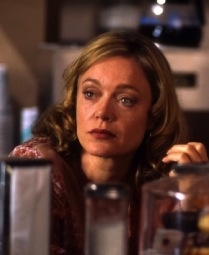Sunday, May 24, 1992.
SOUTH OF WAWA. Written by Lori Lansens. Music by Jeff Bird. Directed by Robert Boyd. Running time: 91 minutes. Restricted entertainment with the B.C. Classifier's warning: frequent very coarse language, occasional suggestive scenes and violence.
WE'RE NO. 1, EH.
Canada is the most livable place in the world. The United Nations says so [in 1992]. (It was in all the papers and, in case you missed it, the feds spent a bundle of your bucks on ads to tell you about it.)
So, how come we're still making dull movies like South of Wawa? Like, who wants to see another movie about hinterland hosers?
Even if we weren't No. 1, this picture would be embarrassing. It's a bore and, what's worse, it's not even original.
South of Wawa recalls all those "great Canadian loser" films made by would-be-great Canadian film-makers over the last 20 years. Here, Toronto-based director Robert Boyd checks out Stayner, Ont., a stagnant gene pool west of Barrie.
Lizette (Rebecca Jenkins), the bored blonde waitress at the local Donut World, is 35 today. She has tickets for the big Dan Hill concert in Toronto.
Terry (Scott Renderer), her loutish mate, would rather go to a bush-league hockey game at the local arena. To keep the peace, he's agreed to go to the concert, but only if they double date with his buddy Simon (Andrew Miller).
When Simon's date falls through, Lizette reluctantly sets him up with the socially retarded Cheryl-Ann (Catherine Fitch), a gauche 21-year-old who says things like "so how's it goin', eh?"
As the story ripens, Boyd offers us glimpses of various townsfolk and their family members. We meet Lizette's overweight kid sister Darlene (Stephanie Forder), who comes on to Simon, and Shannon (Alyson Court), a teen-aged babysitter who comes on to Terry.
Donna (Dawn Greenhalgh), Lizette's mom, runs a boarding house where she encourages Serge (George Touliatos), senior partner in the doughnut shop, to come on to her.
Cheryl-Ann's mother Helen (Samantha Langevin), bedridden with some terminal illness, is one of the few characters not interested in country matters.
This is the sort of material that appeals to rock stars out to prove themselves as film directors. What do you get when you cross David Byrne's 1986 True Stories with John Mellencamp's Falling from Grace (1992)?
Ugly children, like South of Wawa.
It might be different if Boyd displayed any real love for screenwriter Lori Lansen's characters. Unfortunately, he's just another urban sophisticate ushering us into a rube gallery, and insisting that we laugh at the geek show.
The best thing to be said for such awkward efforts is that they're effective as reverse advertising. They can be shown to potential immigrants eager to settle in "No. 1."
The above is a restored version of a Province review by Michael Walsh originally published in 1992. For additional information on this archived material, please visit my FAQ.
Afterword: One director who did recognize Rebecca Jenkins's full potential was fellow Albertan Anne Wheeler. Originally a documentarist, Wheeler switched to directing fictional features in the mid-1980s, casting Jenkins in a supporting role in 1988's Cowboys Don't Cry. A year later, Jenkins was top-billed in Wheeler's Second World War drama Bye Bye Blues, the story of a young wife who joins a dance band to support her family while her husband is in the service. Particularly memorable was its energetic swing music soundtrack featuring Jenkins's own jazz stylings. (In 2005, Jenkins reprised the film's title track during a live performance in Calgary celebrating Alberta's provincial centennial.) Nova Scotians remember her as Katherine Hubbard, the successful Los Angelino who returns home to the Maritimes, the starring role in the three-season television series Black Harbour (1996-1999). She also was part of the ensemble put together by activist director Tim Robbins in his 1992 mock documentary (and political cult classic) Bob Roberts. Though working right across Canada, Rebecca Jenkins currently lives in Vancouver.
